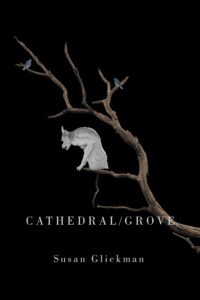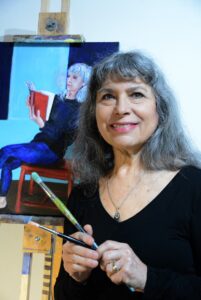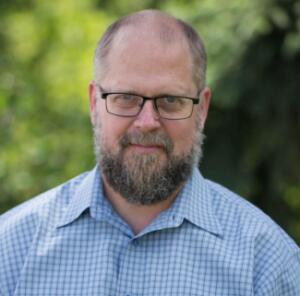‘Liquid song / of praise’
Cathedral/Grove
by Susan Glickman
Montréal: Véhicule Press, 2023
$19.95 / 9781550656350
Reviewed by Al Rempel
*

Susan Glickman’s latest book of poetry, Cathedral/Grove, is forested with a wide variety of poems, or rather, communities of poems, both in style and subject matter. Pockets of prose-poems shoulder up near sunny slopes of free verse; poems that find their roots in daily life–deadheading flowers or walking the dog–stand tall next to poems of troubled histories: the pogroms in Russia or the conflagration of the Notre-Dame de Paris (the latter is described in the poem that forms the centrepiece of the book and shares its title).
Throughout the volume, Glickman (What We Carry) returns to the forest, from noting the “shadow” a tree casts after a snowfall—“as though it were a memory of that tree’s / full-foliaged summer shadow, / the trees themselves stretching generous branches / to the sky, the snow caught up there, / unfallen”—to a startling image in a poem that explores the legend and forest of Robin Hood, where the deer move in “the greenwood, their antlers / another kind of forest, moving.”
As with any journey into the forest, we are confronted with both the familiar and surprises. “I’ve never noticed that before!” is something we can find ourselves saying no matter how many times we’ve entered the same woods. Glickman reveals these wonderful surprises throughout Cathedral/Grove. In “Maple,” she ends with “Like it or not, / everything is a metaphor for everything else: / fish, virus, star, landmine, tree.” Or in “Daphne and Apollo,” where “women fleeing…are sometimes transformed into trees,” Glickman writes, “To become a tree is, / after all, not the worst fate / one can image.” Other delights for this reader include “The gloaming / in which what glows // is the memory of a memory— / a childhood stuffed full / as Noah’s Ark / with beings we believed” and, in “July Afternoon,” where the narrator dozes in the summer heat, “first I will walk along the shore / where my mind meets my mind / to see what I can find there.”

Central to the book, both literally and figuratively, stands “Cathedral/Grove,” a longer poem that explores the history of the Notre-Dame, including an altar from a temple to Jupiter thought to be built by the Parisii tribe, and unearthed from under the site on which the cathedral was built. The poem also pays homage to the Cathedral Grove in MacMillan Provincial Park, one of the last stands of old-growth forests on Vancouver Island. The Notre-Dame was constructed with massive beams, each milled from a single oak tree, and so the roof itself is known as “the forest.” Written in the voice of one of the tribesmen, “Cathedral/Grove” sings like a ballad or lament, with interspersed stanzas in italics such as “voices under the earth / where the river of gold runs deep,” which repeat throughout the poem. The syntax also reinforces the sense of an ancient song: “Gold our smiths fashioned for hundreds of years” or “he of the beautiful horses.”
There are two sections of prose-poems called “Survival Kit,” one about vegetables and the other on tools, both illustrated with hand-drawn sketches by the author. While a casual glance might lead a reader to think they were a product of a poetry prompt, I found these poems to be some of Glickman’s best work. Perhaps the lack of formal constraints lets her roam freer and range farther or maybe it’s just my own perspective and reading of her work, but I think this mode is Glickman’s sweet spot. In “Lettuce,”
Let us consider the facts. I may be mostly water but so are you.
And if water were a vegetable, it would look like me, billow
after billow, at once moving and contained, Rhythm sustained.
A stationary fish. A wish. A wave as thin as a blade. Mermaid.
Or in “Clamp,” where the poem transcends the object/tool almost immediately:
We walked on and
walked on and though we were scared, I carried all my hopes
in my arms—arms that were never empty. He held on tight,
my sweet, sweet child! He held on so tightly I couldn’t tell
where he ended and I began.
Glickman’s readers will encounter much more in Cathedral/Grove, but they will find the same poetic tension found throughout the book, beautifully put in “Nurse Log,” where “the wood thrush pours out her liquid song / of praise, which is the same as her song / of sorrow, which is the same as saying / this is where all things live / and all things die // and all things are reborn.” The poet takes her readers into the forest and then, at the end of the book, back out, into the clearing of a field. In stepping over “small pools in the mud,” we find ourselves with Glickman “crossing over from then to now as though / it were the easiest thing in the world.”
*

Al Rempel’s books of poetry are Undiscovered Country (Mother Tongue, 2018), This Isn’t the Apocalypse We Hoped For (Caitlin , 2013), and Understories (Caitlin, 2010). In January 2025 Caitlin will release Sprocket, a book of poems. Rempel also has four chapbooks, the two most recent published by the Alfred Gustav Press: Behind the Bladed Green, Deerness, Four Neat Holes, and Picket Fence Diaries. Rempel’s poems have appeared in various journals and anthologies across Canada; his video poem collaborations have been screened internationally. For more information, please visit his website. [Editor’s note: Al Rempel reviewed Russell Thornton, Patrick Friesen, and Christopher Levenson for BCR.]
*
The British Columbia Review
Interim Editors, 2023-24: Trevor Marc Hughes (non-fiction), Brett Josef Grubisic (fiction and poetry)
Publisher: Richard Mackie
Formerly The Ormsby Review, The British Columbia Review is an on-line book review and journal service for BC writers and readers. The Advisory Board now consists of Jean Barman, Wade Davis, Robin Fisher, Barry Gough, Hugh Johnston, Kathy Mezei, Patricia Roy, Maria Tippett, and Graeme Wynn. Provincial Government Patron (since September 2018): Creative BC. Honorary Patron: Yosef Wosk. Scholarly Patron: SFU Graduate Liberal Studies. The British Columbia Review was founded in 2016 by Richard Mackie and Alan Twigg.
“Only connect.” – E.M. Forster
One comment on “‘Liquid song / of praise’”